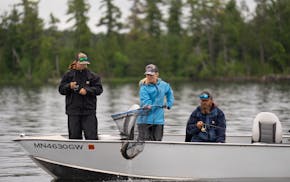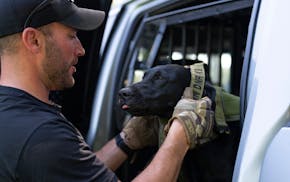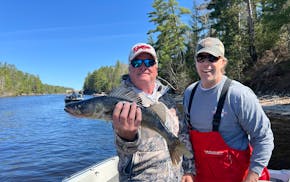"Soccer moms are the enemy of natural history and the full development of a child." — E.O. Wilson
Some years back, in January 1988, just after 3 a.m., I was in a Louisiana marsh. Three federal wildlife agents and I had just paddled two pirogues — a type of canoe — into a tall spit of cane, where we would wait for a few hours, slapping mosquitoes and chiggers.
Keeping an eye out for water moccasins, we passed the time bantering darkly about just who was getting paid less for this stakeout, a trio of civil servants or a two-bit outdoors writer.
The day before, the agents had spotted corn spread in the marsh surrounding a nearby duck blind. Our intent was to wait about three hours until the hunters who had illegally "baited" the area showed up and — equally illegally — killed the wigeon, gadwall, teal and other ducks that, having foregone their natural wariness, would dive bomb the blind to eat the corn.
And get shot.
One of the agents, Dave Hall, was passionate not only about catching bad guys but converting them to legal hunters and proactive conservationists. He had developed a program called "Poachers to Preachers," in which convicted wildlife violators were required to appear at community gatherings to confess to their crimes not only against waterfowl, but against legal hunters, resource conservation and society at large.
That morning, as the eastern sky brightened, an airboat carrying four men descended on the blind. As it did, Hall whispered to me, "I know one of them." Shortly thereafter, ducks flew and the shooting began, continuing for about an hour before the agents and I paddled into an opening near the blind.
"U.S. Fish and Wildlife agents!" Hall and the others shouted, holding their badges aloft.
Hall did, in fact, know the elder of the hunters (more accurately, poachers) who, as it turned out, was in the blind with his three sons.
"I've busted you before," Hall said. "Now you're out here teaching your boys to violate. I'm tired of this. What's it going to take for you to come into the marsh, hunt legally and stop when you've shot a legal limit of ducks?"
Surprisingly, the man gave the question serious consideration, putting one hand to his chin and, for a brief time, looking to the sky, as if querying the heavens.
Finally, he answered.
"Raise the limit?" he said.
Consider now, as Earth Day 2024 approaches, E.O. Wilson's quote about soccer moms that began this column.
A brilliant academician and two-time Pulitzer Prize winner, Wilson in 1984 published a book titled "Biophilia," in which he argued that people have innate tendencies to connect with nature.
Others, including Aristotle, had made similar cases. But Wilson — an Alabamian who spent a lot of time outdoors as a kid, and who was partially blinded in a fishing accident when he was 7 — was among the first to elaborate on the genetic component of the connection, spawning still further research and debate about whether cultural influences might intensify or, conversely, diminish humans' hereditary ties to the earth's fields, forests, wildlife and waters.
It's a question I've pondered often, beginning in that Louisiana marsh long ago.
Ultimately, the poacher who was pinched that morning became a believer in — indeed, a preacher on behalf of — ducks and wetland conservation.
In the years since, I have witnessed similar conversions by people who have learned, whether by education or incentivization (jail time, in the poacher's case), to accommodate nature in their daily lives — even, in some cases, protect it — rather than depreciate it.
Upshot: People who have been exposed to nature, and value those experiences, can change their behavior toward it.
And yet, and yet ... there's Wilson's quote about soccer moms.
Spoken facetiously during a speech, Wilson meant, metaphorically, that all of us, not just moms, neglect to expose our kids to the natural world by "dropping them off at soccer practice."
The quip highlights a conundrum that undergirds the human condition, circa Earth Day 2024.
Namely, unlike in 1970, when the first Earth Day was celebrated, the problem — our problem — no longer is DDT killing eagles or the Chicago River spontaneously catching fire.
Instead, our problem is us, as we whittle away, generation by generation, seemingly without thought or care, our connections to nature.
As we've abandoned small farms and rural communities for urban areas and the bigger paychecks they afford, we've failed to nurture, or even in many cases to acknowledge, our eons-old connections to the natural world, and to bring them with us, as it were.
One result is that instead of accompanying our kids to a lakeshore, a forest or a marsh, and encouraging the joy and imagination that attend physical exploration outdoors — experiences with lifetime benefits — we "drop them off at soccer practice." Or a concert, or wherever.
In a 2008 interview, Wilson was asked, "Is it still possible for most people to nurture a sense of biophilia [meaning connection to the natural world]? Or is it likely to be just crushed underfoot?"
His answer: "That's the dilemma of the 21st century."
So, what are you going to do on this Earth Day?
Buy an electric vehicle? Join a wildlife group? Ride a bike to work?
Go for it.
But if you want to make a difference, head to a lakeshore, a forest or a marsh, and ditch your phone in the process.
Importantly — as if the world depends on it — take a kid with you, any kid. And keep going until it becomes a habit.
In effect, we've all become poachers. But we can change.

Anderson: In early June, Minnesota fish are begging to be caught. Won't you help?

Anderson: Tails wagging, DNR officers' dogs find lost people and missing evidence
Anderson: Punish poachers more
Anderson: The Chainsaw Sisters Saloon is gone, but the Echo Trail is still a pathway to possibilities

